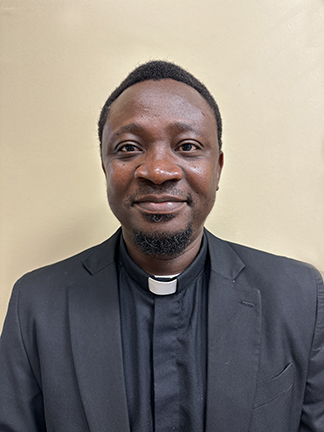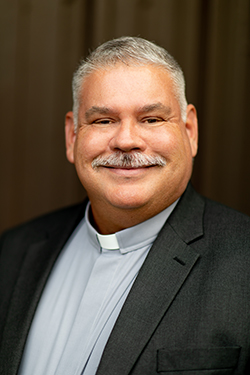First Day of School

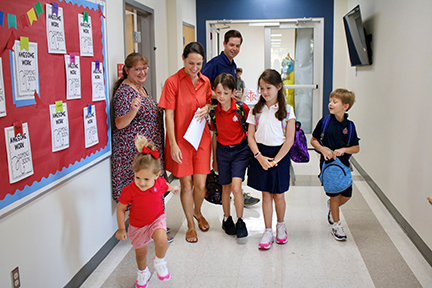

Father PJ Curley shares a warm hug with Nola Brasfield and chats with other Pre-K4 students on the first day of school. (Photo by Laura Kidder)
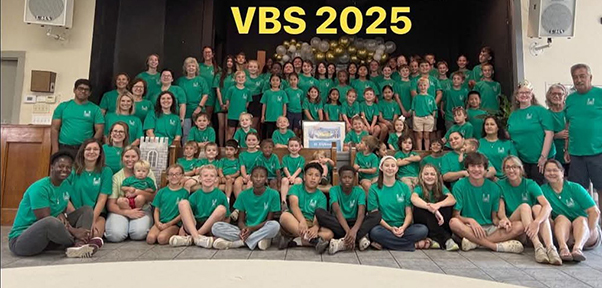




By Bishop Joseph R. Kopacz, D.D.
The Jubilee of Hope has defined Pope Leo XIV’s first 100 days and will continue to be front and center in the early stages of his papacy until the Holy Door is closed on the Feast of the Epiphany in 2026. Eventually, the Holy Father will travel to the ends of the Earth, but for now pilgrims from every country where the Catholic Church has pitched its tent are flocking to Rome in Jubilee faith, hope and love.
Throughout May, June and July, Pope Leo embraced them in the love of God. In an extraordinary way, the Jubilee Year has seamlessly witnessed the transition from the Ignatian Francis to the Augustinian Leo.
Recall that Pope Francis departed this world on Easter Monday, the day after the great day of hope, and his last public appearance was his Urbi et Orbi papal blessing on Easter Sunday. Since his installation one month later as the successor of Peter, Leo XIV has wrapped himself in the banner of hope, praying for peace and unity in the world and in the church in order to create a civilization of love.
The Holy Father’s preaching and teaching are directed to the hearts and minds of all people, but especially to those who have been baptized into the body of Christ and are on the path of discipleship. His words are both a message of consolation and encouragement, as well as a call to conversion and mission.
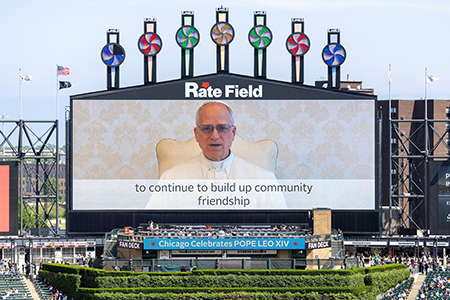
Among his many noteworthy addresses was his message to a packed stadium on the South Side of Chicago. On this occasion, Pope Leo was beamed in from Rome to the faithful gathered at Rate Field – home of the Chicago White Sox – for the celebration of the Eucharist – a Mass of Thanksgiving in the Archdiocese of Chicago for their native son’s emergence as the successor of Peter. Cardinal Cupich imaginatively dubbed his message the “Sermon on the Mound.” The occasion was one of a kind, but his message was universal.
After words of greeting, the Holy Father rejoiced to celebrate on the feast of the Most Holy Trinity, the source of all unity, love and peace. “I begin with that because the Trinity is a model of God’s love for us. God: Father, Son and Spirit. Three persons in one God live united in the depth of love, in community, sharing that communion with all of us.”
During his address, the Holy Father spoke directly to the young people gathered in the stadium and to their peers participating online. It is a powerful message of hope, which I quote in large part: “I’d like to send a special word of greeting to all the young people – those of you gathered together today, and many of you who are perhaps watching this greeting through technological means, on the internet. As you grow up together, you may realize, especially having lived through the time of the pandemic – times of isolation, great difficulty, sometimes even difficulties in your families, or in our world today.
“Sometimes it may be that the context of your life has not given you the opportunity to live the faith, to live as participants in a faith community, and I’d like to take this opportunity to invite each one of you to look into your own hearts, to recognize that God is present and that, perhaps in many different ways, God is reaching out to you, calling you, inviting you to know his Son Jesus Christ, through the Scriptures, perhaps through a friend or a relative … a grandparent, who might be a person of faith. But to discover how important it is for each one of us to pay attention to the presence of God in our own hearts, to that longing for love in our lives, for … searching, a true searching, for finding the ways that we may be able to do something with our own lives to serve others.”
In his reflection, Pope Leo addressed every generation in the People of God to know their dignity as God’s children, to personally know the Lord Jesus as a friend, and to embrace the call to be ambassadors for hope in this world. “So, I would like to invite all of you to take a moment, to open up your own hearts to God, to God’s love, to that peace which only the Lord can give us. To feel how deeply beautiful, how strong, how meaningful the love of God is in our lives. And to recognize that while we do nothing to earn God’s love, God in his own generosity continues to pour out his love upon us. And as he gives us his love, he only asks us to be generous and to share what he has given us with others.”
In other words, play ball in the stadium of God’s kingdom.
August 5
Msgr. Elvin Sunds
Retired
August 14
Father Anthony Claret Onyeocha
St. Joseph Woodville & Holy Family Gloster
August 16
Father Joe Dyer
Retired
September 15
Father Bill Henry
Retired
By Father Nick Adam
We had an atmosphere that was both different and familiar at our annual seminarian convocation in early August. Each summer, the seminarians gather to rest, relax and prepare for the new school year.
This year’s event was familiar because we enjoyed a fun time together, as always. Each morning, we prayed a holy hour, and either Father Tristan, Bishop Kopacz or I celebrated Mass before a day of recreation. The seminarians spent time fishing, swimming, playing pingpong and pool, and simply relaxing.
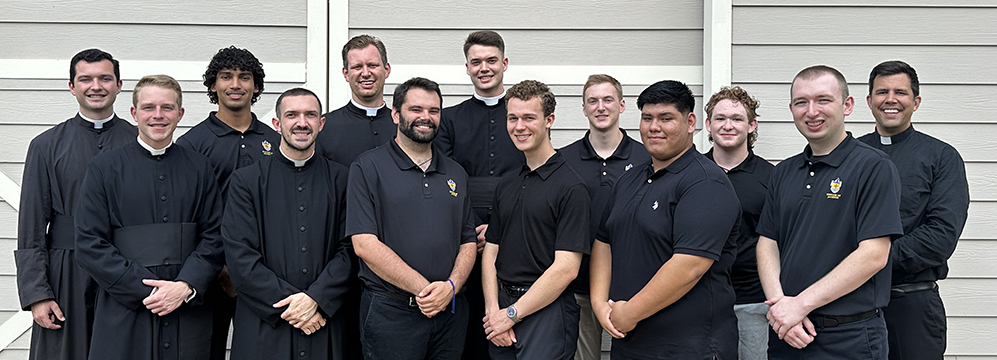
We also took care of some business, including taking photos for our annual poster and reviewing good communication practices and responsibilities for the coming year. Last year, you may have noticed that most of us sported mustaches on the poster – we called it the “mo-poster.” This year, the theme is “normal.” Ha!
What made this year truly different was the number of seminarians in attendance. We are proud and blessed to welcome six new seminarians this academic year – a 100% increase in enrollment. We now have 12 total seminarians. I give thanks to God for this great gift, and I know your prayers have been instrumental in making it possible.
The Lord tells us to beg the master of the harvest to send out laborers for his harvest. We’ve been doing that for years, and he is showing us how faithful he is. Praise the Lord!
Please keep this rapid growth in mind as you consider attending and supporting our Homegrown Harvest Festival in October. This annual fundraiser will take place Saturday, Oct. 11, at St. Francis Catholic Church in Madison. Our goal is to raise $200,000, which will go directly toward funding the education of these future priests. We especially need sponsors.
If you haven’t received information in the mail or online, visit jacksondiocese.org/online-giving and click “Homegrown Harvest” to purchase tickets or become a sponsor.
We have been hard at work in this field for the last six years, and now we have six new seminarians in just one year. The Lord is with us in this mission. If you can help fund the education of our future priests, please consider doing so. I am so proud of our seminarians and grateful to God for this bountiful harvest.
Thanks to so many of you who have been part of this ministry over the years – the best is yet to come!
(For more information on vocations, visit jacksonvocations.com or contact Father Nick at nick.adam@jacksondiocese.org.)
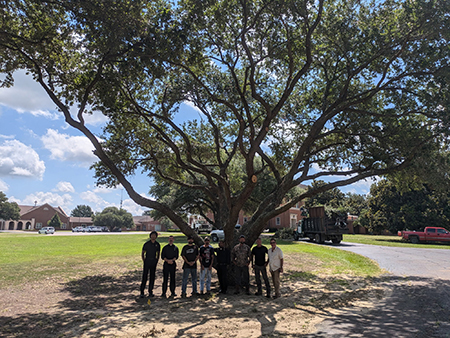
By Cindy Wooden
VATICAN CITY (CNS) – While giving money to charity is a good thing, God expects Christians to do more by giving of themselves to help others, Pope Leo XIV said.
“It is not simply a matter of sharing the material goods we have, but putting our skills, time, love, presence and compassion at the service of others,” the pope told thousands of people gathered in St. Peter’s Square Aug. 10 for the recitation of the Angelus prayer.
Commenting on the day’s Gospel reading, Luke 12:32-48, the pope focused on how Jesus invites his followers to “invest” the treasure that is their lives.
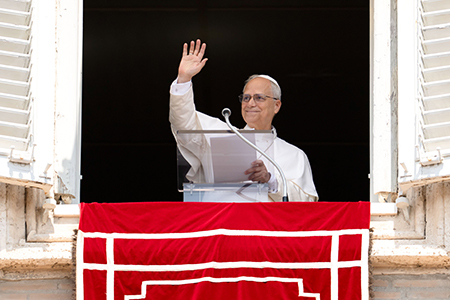
“Everything in God’s plan that makes each of us a priceless and unrepeatable good, a living and breathing asset, must be cultivated and invested in order to grow,” he said.
“Otherwise, these gifts dry up and diminish in value, or they end up being taken away by those who, like thieves, snatch them up as something simply to be consumed.”
“The works of mercy are the most secure and profitable bank” for investing those treasures and talents, the pope said, “because there, as the Gospel teaches us, with ‘two small copper coins’ even the poor widow becomes the richest person in the world.”
Pope Leo urged people to be attentive so that no matter whether they are at home or work or in their parish they do not “miss any opportunity to act with love.”
“This is the type of vigilance that Jesus asks of us: to grow in the habit of being attentive, ready and sensitive to one another, just as he is with us in every moment,” the pope said.
IN EXILE
By Father Ron Rolheiser, OMI
God’s presence inside us and in our world is rarely dramatic, overwhelming, sensational, impossible to ignore. God doesn’t work like that. Rather God’s presence is something that lies quiet and seemingly helpless inside us. It rarely makes a huge splash.
We should know that from the very way God was born into our world. Jesus, as we know, was born into our world with no fanfare and no power, a baby lying helpless in the straw, another child among millions. Nothing spectacular to human eyes surrounded his birth. Then, during his ministry, he never performed miracles to prove his divinity, but only as acts of compassion or to reveal something about God. His ministry, like his birth, wasn’t an attempt to prove his divinity or prove God’s existence. It was intended rather to teach us what God is like and how God loves us unconditionally.

In essence, Jesus’ teaching about God’s presence in our lives makes clear that this presence is mostly quiet and under the surface, a plant growing silently as we sleep, yeast leavening dough in a manner hidden from our eyes, spring slowly turning a barren tree green, an insignificant mustard plant eventually surprising us with its growth, a man or woman forgiving an enemy. God works in ways that are seemingly hidden and can be ignored by our eyes. The God that Jesus incarnates is neither dramatic nor flashy.
And there’s an important lesson in this. Simply put, God lies inside us, deep inside, but in a way that is almost unfelt, often unnoticed, and can easily be ignored. However, while that presence is never overpowering, it has inside of it a gentle, unremitting imperative, a compulsion, which invites us to draw upon it. And if we do, it gushes up in us as an infinite stream that instructs, nurtures, and fills us with life and energy.
This is important for understanding how God is present inside us. God lies inside us as an invitation that always respects our freedom and never overpowers us, but also never goes away. It lies there precisely like a baby lying helpless in the straw, gently beckoning us, but helpless in itself to make us pick it up.
For example, C.S. Lewis shares this in explaining why, despite a strong affective and intellectual reluctance, he eventually became a Christian (“the most reluctant convert in the history of Christendom”). He became a believer, he says, because he was unable to ultimately ignore a quiet but persistent voice inside him which, because it was gentle and respectful of his freedom, he could ignore for a long time. But it never went away.
In retrospect, he realized it had always been there as an incessant nudge, beckoning him to draw from it, a gentle unyielding imperative, a “compulsion” which, if obeyed, leads to liberation.
Ruth Burrows, the British Carmelite and mystic, describes a similar experience. In her autobiography Before the Living God, she tells the story of her late adolescent years and how at that time in her life she thought little about religion and faith. Yet she eventually ends up not only being serious about religion but becoming a Carmelite nun and a gifted spiritual writer. What happened?
Triggered by a series of accidental circumstances, one day she found herself in a chapel where, almost against her conscious will, she left herself open to a voice inside her which she had until then mainly ignored, precisely because it had never forced itself upon her freedom. But once touched, it gushed up as the deepest and most real thing inside her and set the direction of her life forever.
Like C.S. Lewis, she too, once she had opened herself to it, felt that voice as an unyielding moral compulsion opening her to ultimate liberation.
This is true too for me. When I was seventeen years old and graduating from high school, I had no natural desire whatsoever to become a Roman Catholic priest. But, despite a strong affective resistance, I felt a call to enter a religious order and become a Catholic priest. Despite that strong resistance inside me, I obeyed that call, that compulsion. Now, sixty years later, I look back on that decision as the clearest, most unselfish, faith-based, and life-giving decision I have ever made. I could have ignored that beckoning. I’m forever grateful I didn’t.
Fredrick Buechner suggests that God is present inside us as a subterranean presence of grace. The grace of God is “beneath the surface; it’s not right there like the brass band announcing itself, but it comes and it touches and it strikes in ways that leave us free to either not even notice it or to draw back from it.”
God never tries to overwhelm us. More than anyone else, God respects our freedom. God lies everywhere, inside us and around us, almost unfelt, largely unnoticed, and easily ignored, a quiet, gentle nudge; but, if drawn upon, the ultimate stream of love and life.
(Oblate Father Ron Rolheiser is a theologian, teacher and award-winning author. He can be contacted through his website www.ronrolheiser.com.)
FROM THE HERMITAGE
By sister alies therese
As in a responsorial psalm, repeat after me: God is in the obstacle.
Or so they thought. Or so they said. However, for some, in that desert, after a little while, when the buzz quiets, something else takes over – a kind of resistance, acedia. It is not just monks and nuns who suffer this; married people, singles, anyone can fall prey.
Kathleen Norris, in her exceptional book “Acedia & Me,” tells how the word itself has gone through a myriad of definitions since the earliest writings in “The Praktikos” of Evagrius Ponticus (345–399). Some are: “Acedia: the deadly sin of sloth; or spiritual torpor and apathy,” according to Webster’s Third New International Dictionary. The Oxford English Dictionary defines “accidie” as heedlessness, torpor … a non-caring state. The Online Medical Dictionary describes “acedia” as a mental syndrome whose chief features are listlessness, carelessness, apathy and melancholia.
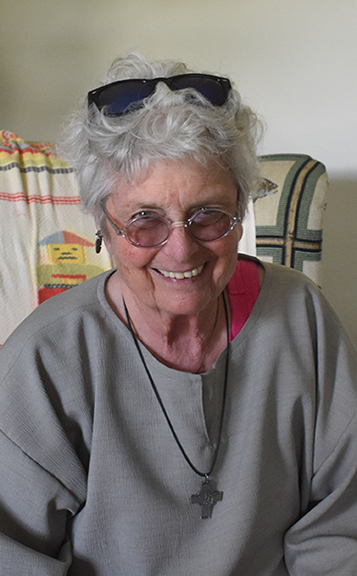
Repeat: God is in the obstacle.
When the seeker would ask about this struggle, Abba Poemen would advise: “Watchfulness, self-knowledge, and discernment. These are the guides of the soul,” according to “Desert Fathers and Mothers” by Jonathan Wilson-Hartgrove.
Isadore of Pelusia offered this: “Many desire virtue, but fear to go forward on the way that leads to it, while others consider that virtue does not even exist. So, it is necessary to persuade the former to give up their habitual idleness, and to teach the others what virtue really is.”
Amma Syncletica said there is an asceticism determined by the enemy and practiced by his disciples. She asked, “How are we to distinguish between the divine and demonic tyranny?” Her answer was: “We must arm ourselves in every way against the demons. For they attack us from outside, and they also stir us up from within; and the soul is like a ship when great waves break over it, and it sinks because the hold is too full,” as recorded in “The Sayings of the Desert Fathers” by Benedicta Ward. And you ask, how is God in the obstacle?
Amma Theodora, renowned for her wisdom, tells us it is good to live in peace, practicing perpetual prayer. “However,” she says, “you should realize that as soon as you intend to live in peace, at once evil comes and weighs down your soul through accidie, faintheartedness and evil thoughts. It also attacks your body through sickness, debility, weakening of the knees and all the members. It dissipates the strength of the soul and body, so that one believes one is ill and no longer able to pray,” also from “The Sayings of the Desert Fathers.”
Yes, you’ve had this experience. You sit down to pray, feeling quite good, knowing you will talk with God … when you remember your shopping list, calling your mother or watering the plants. It will only take a minute, so you do that thing. Then the phone rings, the TV goes off, the kids pack in from school … and it keeps happening. Those little demons of distress wiggle into your soul, and it seems there’s not much you can do about the indifference, weariness, lax intentions or dryness that grows.
Cassian wrote that “if we are overcome by sloth or carelessness and spend our time in idle gossip, or are entangled in the cares of this world and unnecessary anxieties, the result will be that a sort of species of tares will spring up and occupy our hearts, and as our Lord and Savior says, wherever the treasure of our works or purpose may be, there also our heart is sure to continue.”
Sloth is a culpable lack of physical or spiritual effort; acedia or laziness. One of the capital sins, according to the Catechism of the Catholic Church, sins are called “capital” because “they engender other sins or vices.” (1866) This spiritual effort manifests itself mainly during prayer and in the life of one given to God; this is a disaster. “Someone said to Antony, ‘Pray for me.’ The old man said to him, ‘I will have no mercy upon you, nor will God have any, if you yourself do not make an effort,’” writes Benedicta Ward from Carrigan’s “The Wisdom of the Desert Fathers and Mothers.”
Acedia in full bloom looks like frustration or weariness, experienced as sadness – “sadness in relation to a spiritual good … a retreat from the divine good itself,” as St. Thomas Aquinas says in “Summa Theologica.” I just don’t care. I can’t be bothered.
Kenneth Russell, in his article in “Review for Religious,” writes that “acedia is a gray morning’s inclination not to intensify the original yes to God, community or spouse … choose to swim no further. … What they really opt for is some means of control over their own comfort. … The victims of acedia tread water and console their anxieties with sleep or attempt to dissipate them in one distraction after another.”
David of Augsburg (d. 1272) described “accidie” in three kinds: the first is bitterness of mind that cannot be pleased by anything cheerful or wholesome; the second, a kind of indolent torpor loving sleep and comfort; and the third, “a weariness in such things as belong to God, praying without devotion, rushing through, thinking of other things as not to be bored.” Chaucer’s “Parson’s Tale” notes that “envy and anger cause bitterness, which is the mother of acedia, and takes from a man the love of all goodness. Then is acedia the anguish of the troubled heart; as St. Augustine says, ‘It is the sadness of goodness and the joy of evil.’”
How can God be here?
It has been a very hot summer; maybe your prayer is distressed? Think of the Noonday Devil, as acedia is often called – for at the height of noon the sun beats down, the pray-er is hungry, nothing is going right, and one could not be convinced God is in these obstacles. Give up. But I was meant for this – this community, this vocation, this spouse. Or was I? The demon of doubt squeaks in. This is where my talent lies – the very one given to me by God, you try to think. Mark Cuban, the entrepreneur, quipped: “Talent without effort is wasted talent. And while effort is the one thing we can control, applying that effort intelligently is next on the list.”
Finally, Abbot Jean-Charles Nault, OSB, sums it up when he writes that “acedia is the enemy of spiritual joy … a profound withdrawal into self to save one’s freedom at any price … no longer any room for an abandonment to the other or for the joy of gift. What remains is sadness or bitterness … distancing oneself, separated from others and likewise separated from God,” as he wrote in “Enemy of Spiritual Joy” in Communio journal.
What to do: Intensify your prayer. Don’t look for distractions. Be vigilant. Don’t settle for being less than you can. Don’t refuse responsibility. Do for others. Search for God in the obstacles. Life in God is not a spectator sport.
“And should our branches be broken off by negligence, carelessness, disdain or ruin, may these reckless prunings carry even more significance as symbols of peace in a broken world,” wrote Sister M. Guider, OSF.
God is in the obstacles.
God has found you.
Blessings.
(sister alies therese is a canonical hermit who prays and writes.)
From the Archives
By Mary Woodward
Recently, I assisted in setting up for the Bishop’s Ball, Catholic Charities’ annual fundraiser. This year the event was held at the Two Mississippi Museums in Jackson, a wonderful complex featuring the state’s history from prehistoric times to the present, and a whole building devoted to the civil rights movement.
During a break from setting up, I went upstairs to view a special exhibit on Hurricane Katrina. Aug. 28 marks the 20th anniversary of the catastrophic storm that claimed more than 1,800 lives and caused more than $125 billion in property damage. The exhibit was a collection of photographer Melody Golding’s work enlarged for the space and various items salvaged from the storm that are part of the Mississippi Archives and History Collection.
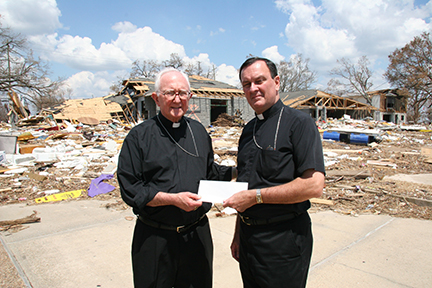
Also included were displays of facts and figures and one interesting list of “Things We Learned.” On this list were simple realizations such as: “We can all ride in one car”; “A bag of ice is better than a sack of gold”; “Any brand of coffee will do”; and “Your neighbor is part of the family.”
Thinking back to 20 years ago as we approach the anniversary, I remember all the moving parts the diocese and Catholic Charities coordinated in the aftermath of that devastating storm. I remember all the hotels and shelters in Jackson being filled with Gulf Coast refugees fleeing the path. I remember taking blankets, pillows and Bibles to the Coliseum in downtown Jackson, which was serving as a shelter and was unprepared for the number of people who arrived.
I remember watching the helicopter flyover of the Coast on my battery-operated mini TV the morning after the storm and thinking, this is not real. I remember dragging a 10-foot turret from the cathedral’s steeple into the bishops’ burial ground to keep it safe from copper thieves.
I remember making a trip down to the Coast a few months after the storm with Bishop William Houck, who was then serving as president of Catholic Extension in Chicago. He was bringing prayers, greetings and a check to the Diocese of Biloxi, which suffered immense damage from the tidal surge, flooding and winds of Katrina.
There are so many memories that the entire World Wide Web could not hold them. As I was preparing for this column, I went through some of the old press releases we had done as part of the ongoing disaster recovery plan – one that came together on the fly because no one ever expected something such as Katrina.
Here is one of those releases that shows the many moving parts mentioned above:
Catholic Diocese of Jackson/Catholic Charities Jackson
September 2005
Schools:
Rural areas:
Jackson distribution warehouses:
Parish efforts:
As I read through this list, I remember how well everyone worked together under incredibly difficult circumstances. Tempers did flare at times because it was very hot and there was no power for weeks, even as far north as Jackson, but those flare-ups were met with understanding and forgiveness.
Collectively, we remembered that “we can all ride in one car.”
(Mary Woodward is Chancellor and Archivist for the Diocese of Jackson.)
